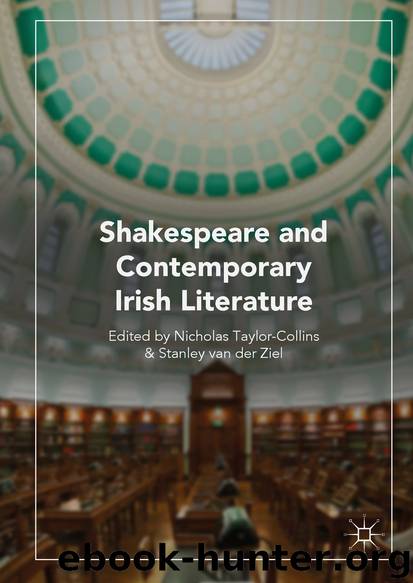Shakespeare and Contemporary Irish Literature by Unknown

Author:Unknown
Language: eng
Format: epub
ISBN: 9783319959245
Publisher: Springer International Publishing
6. The Politics of Translation in Brian Friel’s Translations and Shakespeare’s Henry Plays
Anthony Roche1
(1)University College Dublin, Dublin, Ireland
Anthony Roche
Email: [email protected]
One could argue that Shakespeare is so pervasive in world culture, both in the staging of his plays globally and in the teaching of English, that his influence is inescapable. In relation to contemporary Irish playwrights in general and Brian Friel in particular, the issue is not so much one of influence but of a self-aware referencing of Shakespeare’s drama. Irish playwrights do not consciously adopt a Shakespearean model or structure for their plays; they remain too aware of the differences between the cultures, too involved in a postcolonial project which seeks to subvert the dominant status quo, to do that. But they frequently make of Shakespeare an important cultural, political and dramatic reference point in their drama, to mark his presence but also to mark off their difference and distance from him.
On the night of 23 September 1980 an audience gathered in the Guild Hall in Derry in Northern Ireland for the world premiere of Brian Friel’s play Translations . 1 That audience represented the complete spectrum of politics in Northern Ireland—from Sinn Féin and the SDLP on the Catholic side through various shades of unionism and loyalism on the other. Translations was the inaugural play of the Field Day Theatre Company, co-founded by Friel and actor Stephen Rea to make a decisive intervention in the politics of Northern Ireland and to reconsider the historically fraught relationship between Ireland and England. 2 To do so, Friel and Rea took over the Guild Hall for this and subsequent Field Day premieres. The Guild Hall was not a custom-built theatre; indeed, its sight-lines and acoustics were extremely poor. Rather, it was the centre of administration in Derry and, as Christopher Morash puts it, ‘a symbol of Unionist power’. 3 Derry’s Guild Hall was the never-reached destination of the Civil Rights marchers in January 1972, when the deaths of thirteen of their number at the hands of the British Army caused it to be known thereafter as Bloody Sunday . Friel responded in 1973 with The Freedom of the City , in which three Catholic marchers stumble into the Guild Hall by accident and proceed to make themselves at home, before emerging to be shot by the British Army. Seven years later, Brian Friel and Stephen Rea once more took over the Guild Hall for the Field Day premiere of Translations, a symbolic appropriation of a discriminatory civic space for theatrically subversive and liberationist ends.
What kind of play, precisely, did the audience at the Guild Hall encounter that night? Friel argued in a diary kept at the time of writing Translations that the play ‘has to do with language and only language .’ 4 This analysis will focus on the inter-connected issues of language and translation in the play, and do so by examining the two Shakespeare plays which most help to illuminate its central concerns: Henry IV Part 1 and Henry V .
Download
This site does not store any files on its server. We only index and link to content provided by other sites. Please contact the content providers to delete copyright contents if any and email us, we'll remove relevant links or contents immediately.
The Art of Boudoir Photography: How to Create Stunning Photographs of Women by Christa Meola(18624)
Red Sparrow by Jason Matthews(5472)
Harry Potter 02 & The Chamber Of Secrets (Illustrated) by J.K. Rowling(3677)
In a Sunburned Country by Bill Bryson(3542)
Drawing Cutting Edge Anatomy by Christopher Hart(3526)
Figure Drawing for Artists by Steve Huston(3451)
Harry Potter and the Prisoner of Azkaban (Book 3) by J. K. Rowling(3359)
The Daily Stoic by Holiday Ryan & Hanselman Stephen(3317)
Japanese Design by Patricia J. Graham(3174)
Make Comics Like the Pros by Greg Pak(2917)
The Roots of Romanticism (Second Edition) by Berlin Isaiah Hardy Henry Gray John(2916)
Stacked Decks by The Rotenberg Collection(2883)
Harry Potter and the Deathly Hallows (7) by J.K. Rowling(2724)
Draw-A-Saurus by James Silvani(2719)
Tattoo Art by Doralba Picerno(2668)
On Photography by Susan Sontag(2639)
Churchill by Paul Johnson(2584)
The Daily Stoic by Ryan Holiday & Stephen Hanselman(2574)
Drawing and Painting Birds by Tim Wootton(2510)
